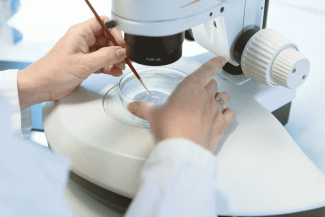Alzheimer’s, Parkinson’s, brain tumours, stroke, epilepsy, multiple sclerosis, depression, ALS, rare neurological diseases, etc. Brain diseases affect people of all ages with a major impact on those close to them. These are often disabling diseases for which there are often no effective treatments yet.
By choosing to make a bequest, a donation, or by designating Paris Brain Institute as the beneficiary of a life insurance policy, you are entering the history of tomorrow’s great discoveries: those that will prevent, treat, and cure brain diseases. It is a tremendous gesture that will advance science and medicine, and can change the lives of millions of people and their loved ones.
As a recognized Foundation of Public Utility, Paris Brain Institute is entitled to receive bequests, donations and life insurance by being totally exempt from the payment of inheritance and transfer duties. The whole of what you transmit therefore directly benefits the research.
For more information on donation
In the fight against Alzheimer’s, Parkinson’s, brain tumours, ALS, epilepsy, depression, stroke, multiple sclerosis… it’s not just the researchers who push research forward...
Different modes of transmission
There are several ways to pass on all or part of your assets, including bequests, donations and life insurance.

Un acte fort et engagé pour le futur de la recherche sur le cerveau et les générations à venir

Des dispositions efficaces pour une transmission immédiate, pour aider dès maintenant les chercheuses et chercheurs de l’Institut du Cerveau.

Un placement financier simple pour transmettre un capital à la Fondation Institut du Cerveau
Your questions on the transfer of assets
- A bequest allows you to pass on some or all of your assets (furniture and real estate) to Paris Brain Institute. To be considered, your will to bequeath must be the subject of a will that will not take effect until you die. Your will may be amended or annulled by you at any time.
- A gift is an act by which you irrevocably transfer during your lifetime the rights or ownership of a property to Paris Brain Institute. All donated goods can be used in your lifetime to speed up the search.
- Life insurance is a simple solution for transferring capital within a favourable tax framework. At any time, a person who has taken out a life insurance policy may decide to register Paris Brain Institute as a beneficiary or co-beneficiary of this savings upon termination or death.
As a foundation recognised for the public good, Paris Brain Institute is entitled to receive all types of property: movable property (such as a sum of money or a portfolio of securities), immovable property (a house, a business premises, a plot of land, etc.), as well as copyright, jewellery and works of art.
Yes. Depending on your family situation, if you have direct heirs (spouses, children, grandchildren, great grandchildren), the law provides that a part of your estate, called a "reserve", is rightfully theirs. But you have a share, called "available share", which you can pass on to Paris Brain Institute: between 1/4 and 3/4 of your assets. Do not hesitate to contact your notary.
There is no minimum amount for a bequest to Paris Brain Institute. All assets, regardless of the amount, are useful for advancing research and developing new treatments.
In the absence of a will, your property will automatically be divided between your heirs according to the legal provisions. If you have no heirs, and in the absence of a will, your estate will revert entirely to the state.
To make a bequest, the notary can give you advice specifically adapted to your situation. He will be able to record your will in the central disposition file, which ensures that it is found and taken into account.
Your notary may also be able to help you write your will. His expertise and knowledge of procedures in the field of estate settlements will allow you to make the right choices for you and your heirs.
Contact Us
Are you wondering about the transmission of all or part of your heritage?

Votre contact dédié pour toute question ou pour un rendez-vous :
Carole CLÉMENT, responsable des relations avec les testateurs.
01 57 27 41 41 - Carole.clement@icm-institute.org

